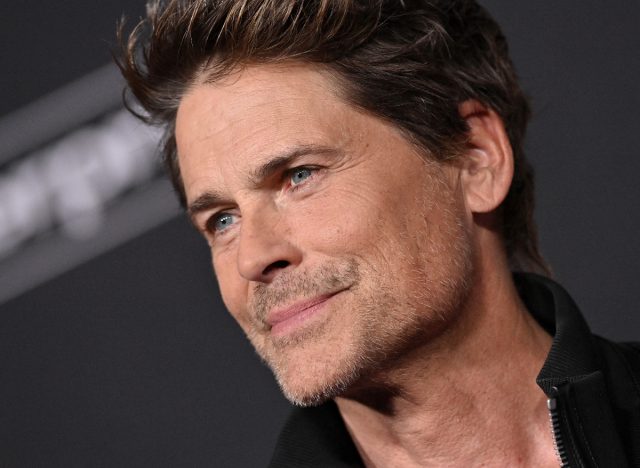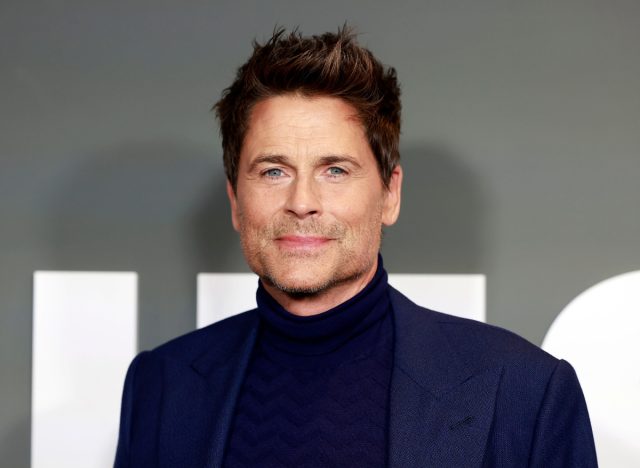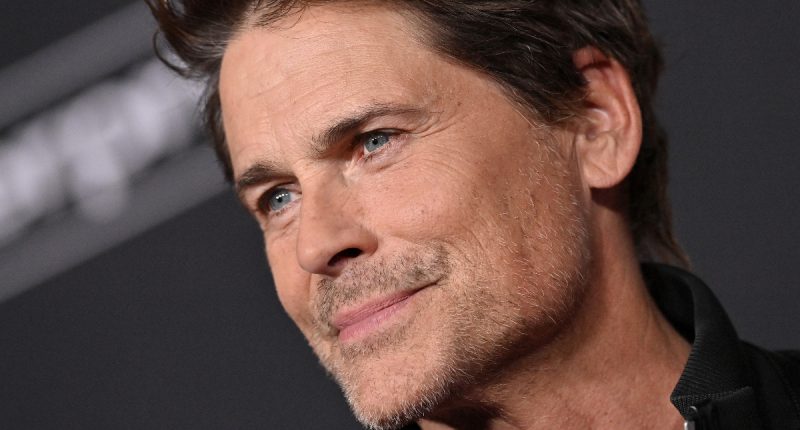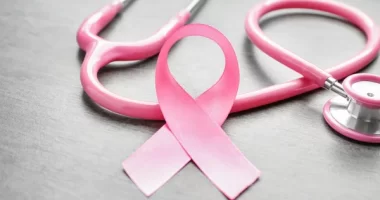
Rob Lowe Reveals His Secrets to Staying Fit & Healthy at 59: Exclusive – There’s so much to love about Rob Lowe. The 59-year-old actor, writer, and producer has been crushing it in Hollywood since the ’80s, cementing his icon status as a member of the “Brat Pack” in his teens alongside fellow celebs like Demi Moore, Molly Ringwald, and Emilio Estevez. Since then, he’s wracked up more than 100 acting credits, with memorable starring roles on Parks and Recreation and The West Wing, and more recently, the Netflix series Unstable—in which he co-stars with his real-life son, John Owen Lowe, a burgeoning actor, writer, and producer in his own right.
Now, the dynamic father-son duo has joined forces for a new Atkins campaign, and Rob Lowe is spilling the tea on his secrets to staying fit and healthy. Given that he’s managed to remain a bona fide heartthrob for four decades—and counting!—we jumped at the chance to talk to him about the new partnership, his favorite ‘cheat day’ meals, his 33 years of sobriety, his upcoming new TV series The Floor, his favorite exercises, and more. Read on for some highlights from our interview, then watch the complete video of our interview below.
Some quotes have been condensed and edited for clarity.
Lowe is all about the low-carb life.

Rob Lowe embraces the low-carb life—so much so, in fact, that he’s been the Atkins‘ brand spokesperson since 2018. Lowe is a major fan of things he can easily be consistent with and stick to for the long haul, and for him, that’s Atkins.
“What I love about Atkins is it really is a lifestyle,” he explains. “It’s not a diet. It may have started as a diet back in the day, but it’s [about] low-carb, high-protein, low-sugar, which is the way I was eating before I started to work with them,” he says, adding, “It just works. It keeps life simple, and I find it incredibly easy to navigate.”
Anyone who’s dieted knows that half the battle is finding something that actually works for you. Lowe was lucky enough to find that in Atkins. “Not everything sticks, so I find diets in and of themselves problematic for me,” he says. “What I try to do is figure out, ‘What am I capable of sustaining?'”
In addition, Lowe claims that adhering to the Atkins lifestyle is extremely manageable, whether you’re cooking at home or ordering at a restaurant. “I’m going to have the chicken parm, no breading. Done!”
He has a major sweet tooth.
Lowe is front and center in Atkins’ new campaign, “Who Knew?” along with comedian and actress Wanda Sykes. During the first installment of the series, titled “Candy Drawer,” Sykes is super suspect about how Lowe can look as great as he does while snacking on delights like the Atkins Keto Caramel Almond Clusters and Peanut Butter Cups. “My sweet tooth never takes no for an answer,” Lowe tells Skyes. And quite honestly, we get it, Rob Lowe.
For the record, we tried the Caramel Almond Clusters and Peanut Butter Cups for ourselves, and they’re the real deal—or “the real thing,” as Lowe puts it. Each Caramel Almond Cluster is just 100 calories, offers six grams of fiber, and contains two grams of protein, while each Peanut Butter Cup is only 80 calories, offers two grams of fiber, and has one gram of protein. It’s essential to have healthy, easy, and tasty snacks handy because you’re more likely to get derailed if you don’t have convenient and guilt-free options to snack on when a craving hits.
As a self-proclaimed lover of sweets, being able to indulge in these treats as part of a healthy diet is one of the reasons Lowe embraces Atkins. “The real thing that makes the difference for me [is] the products that I get to have in lieu of having, say, a milkshake,” Lowe says. “I love my sweets—I love them! The fact that Atkins makes the best chocolate shake—high-protein chocolate shake, low sugar—it’s a game-changer for me, because late at night when I want something sweet, I have that. It’s awesome. The chocolate chip peanut butter cup is sick; it’s so good,” he emphasizes, adding, “I would eat that stuff all day if I could.”
A little sweet tooth hack from Lowe? “I put my Atkins shake in the freezer, and I go for that instead of ice cream.” Yum!
Even Rob Lowe Has a ‘Cheat Day’ Meal
Lowe stresses that in order to make healthy habits a lifestyle, sustainability is key—and that includes treating yourself, as long as it’s in moderation. Lowe enjoys the occasional cheat day just like the rest of us. Some of his favorites include pizza and ice cream, but his “real Achilles heel” is baked goods. “My grandpa ran a restaurant that specialized in pies. So I grew up as a kid going into the walk-in freezer, and there would be slices of individual pies […] chocolate custard, vanilla custard, apple, cherry pie,” Lowe tells us. “I still dream about it.”
So what’s Rob Lowe’s favorite kind of pie for cheat day? An old-fashioned cream pie from The Spot Restaurant in Sydney, Ohio (along with banana cream pie and chocolate cream pie). “Cream and pie, what could possibly go wrong?” he jokes.”As of yet,” Lowe says, “Atkins doesn’t have a cream pie.” Maybe this is a sign for them to get on that, but in the meantime, the occasional cream pie is fine, as long as it doesn’t become a habit.
He has “a love-hate relationship” with salads.

What does a typical meal look like for Lowe? He was off to enjoy a tostada salad after our interview, as he’s a huge fan of Mexican cuisine. And for dinner? “Tonight, I will probably have some really cool, tasty salad,” he says, although he admits that salads aren’t always the answer for him. “I have a love-hate relationship with salads; they’re either awful or they’re so good.” Lowe’s advice? “You’ve got to make it a meal so it becomes an actual meal; it’s not like a thing on the side.”
Lowe tells us that a typical dinner at home might include a salad topped with salmon, chicken, steak, or “something really super yummy,” like a burger. “That’s probably the vibe,” Lowe adds.
He admits to being “that guy” who’s always game for an invigorating activity.
Whether you’re trying to lose weight or not, a healthy lifestyle isn’t just about food; it also requires a fitness routine. Lowe says he loves the great outdoors and will never say no to an invigorating activity. In fact, when it comes to workouts, he can’t get enough. “I’m really lucky and blessed that I love being active. I know people who have to force themselves into the gym; I have to force myself out of the gym,” he tells us. “It’s not good to work out every day, but I would because I enjoy the endorphins, I enjoy the rush of it.”
One thing that does get him out of the gym is outdoor activities. “If there’s a hike to be had, I’ll do that,” Lowe shares. “Maybe it’s a run; [perhaps] it’s a dry sand beach run with sprints and pushups in between. When the weather’s nice, I’d rather do that. Maybe a swim. And then, I [also] love tennis and skiing.”
He totally owns up to being “that guy” who’s game for virtually any exercise or activity that presents itself. In fact, he notes that if someone says, “Hey, we’re going on a 10-mile horseback ride,” he’s 100% in.
He’s been sober for 33 years.
Lowe has been very open about his sobriety—a journey he’s been on for more than three decades. We asked how his recovery intersects with his healthy lifestyle. “I’ve been sober now for 33 years, so it’s very much in my DNA—the choices that you have to make to stay on the road,” Lowe tells us. “At this point, it’s baked in, and I couldn’t be more grateful for it. I sometimes forget what a leg up that gives me in terms of my health.”
He stresses the importance of checking in on your relationship with alcohol before even considering tweaking your eating habits. Maybe it’s all “good in the hood,” as Lowe puts it. But it’s crucial to keep in mind that even social drinking or “wine culture” can lead to unwanted weight gain (or more serious issues).
What’s up next for Rob Lowe?
When he’s not hitting the gym or talking about Atkins, these days Lowe is working on hosting duties for The Floor, his forthcoming game show. He describes it as a marriage of strategy and politics—sort of a real-life Game of Thrones, if you will—that has both a physical and trivia component. Contestants have the chance to battle for a $250,000 cash prize. (Sounds like that could buy quite a few Atkins’ Caramel Almond Clusters!)
“[The Floor] is so addicting—so addicting,” Lowe raves. “It combines two of my favorite games: It’s Trivial Pursuit mixed with Risk. You’ve got to get the questions right, and you battle with somebody to get the question, but when you do, you get their area on the floor. And now it’s like a chess game; who do you really want to challenge? And whose knowledge do you think is not going to stand up to your knowledge?”
Gear up to tune into The Floor on Fox, coming soon, and watch our entire video interview with Rob Lowe, below.
Kindly read more from the website homepage









